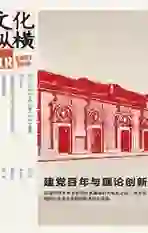英文目录
2021-08-31
Overseas
12 The Resurgence of “Alliance Politics”?
Sun Jingchao
16 Cover Story: The Centenary of the Communist Party of China and Relevant Theoretical Innovation
18 The Political Themes of Modern and Contemporary China and the Reconstruction of Orthodoxy and Politics
Cheng Yawen
To a certain extent, the collapse of the Qing Dynasty was the result of the disintegration of Chinese society and politics by the globalization led by Britain, which forced modern and contemporary China to reconstruct its political theme. The reconstruction of orthodoxy and politics in modern and contemporary China effectively established the political autonomy and cultivated the initiative of development. Chinas revolution and construction also contain solutions to global problems. This kind of experience is precious when the relationship between capital and politics in the contemporary world changes again in globalization.
28 Ruling Capital — The Political Economy of Socialist Market Economy
Lin Yanzhi
39 The Reconstruction of Historical View from the Perspective of China
Li Wentang
49 The Adaption of Marxism to the Chinese Context and Modern Chinese Civilization Yao Yang
For the last two centuries, China has been deeply influenced by western civilization; the Communist Party of China (CPC) itself was a product of the spread of western ideas. Over the last 40 years, though, the CPC has started to turn back to Chinese traditions and achieved enormous success. Standing at its centenary, the biggest challenge that the CPC faces is the tension between its Marxist orthodoxy and its Chinese practice. Filling this gap will lead to the creation of a modern Chinese civilization.
60 The Communist Party of China and Socialism with Chinese Characteristics — Summary of “Theoretical Innovation in the New Phase of Development in China” Seminar
Beijing Cultural Review
70 Academic Review
Edge thinking
Xiang Biao
Drawing on my study on a migrant community in Beijing in the 1990s, I demonstrate that the centralization, and assetization, of market mediation, destroyed migrants cybernetically networked transactions. Based on this I suggest that, while Artificial Intelligence greatly increases individuals capabilities in commercial transactions, it may also render individuals dependent by centralizing mediation, which introduces a virtual “feudalism” and reinforces formal institutions. Methodologically this essay contributes to “edge thinking”: rethinking fundamental categories at supposed turning points of history.
Explore the New Space for Chinese Economy
80 Reshaping the Economic Relationship between China and the World through the “Dual Circulation”
Cao Yuanzheng
After becoming the worlds largest market in 2019, China has grown into a hub that mediates developed and developing economies. The “Dual Circulation” development pattern is now taking the expansion of domestic demand as its strategic basis, aiming for a super-large domestic market, and making it open to the world through institutional openings. The process of such mutual promotion could also be seen as Chinas efforts to rearrange the economic relationship between China and the world.
93 State, Currency and Economic Development — New Political Economy of Chinas Path to Growth
Wen Chang
Observation· Culture
106 Fated by the Time: the Cultural Logic behind the Unexpected Outreach of New-Style Patriotic Dramas
Mao Jian
114 Image, History and Thought Movement — Awakening Age(Jue Xing Nian Dai) and the Historical View in Contemporary China
Dong Muzi
New Development Knowledge
121 Asian Infrastructure Investment Bank:Exploring Practical Development Paths according to Developing Countries Situation
Du Xinlei
Following the international norms, the AIIB takes “improving infrastructure connectivity” as the banks purpose, cooperates with other banks such as the World Bank, and becomes a widely representative and inclusive bank. The AIIBs interpretation of “international development” is different from that of the traditional multilateral development banks in terms of concept and practice, and more in line with the actual situation of developing countries and emerging economies.
Social Structure Transition
130 Living beyond Xiao-Kang:The Emergence of Post-Modern Value and the Challenges it brings
Fang Ning
Feng Jungong
138 Preserving Properties or Family? — The New-Style Marriage in Chinas Rich Rural Areas
Guo Liang
Overseas Ethnography
147 Understanding as a Must for Aiding — Field Notes in African Villages
Wang Xiaoyi
Since 1970s, China has been providing agricultural aid to Africa, including sending technicians, establishing extension centers and investing agriculture. However, we still lack close observation and comprehensive understanding of African villages, which are key factors for successful aid practices. Based on systematic observation and in-depth interviews in two Ethiopian villages, Mugaro and Fingilee, this article described development of their social network, agriculture and other economic activities, analyzed challenges on land use and education to explore African future demand for aid.
